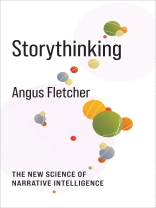Every time we think ahead, we are crafting a story. Every daily plan—and every political vision, social movement, scientific hypothesis, business proposal, and technological breakthrough—starts with “what if?” Linking causes to effects, considering hypotheticals and counterfactuals, asking how other people will react: these are the essence of narrative. So why do we keep overlooking story’s importance to intelligence in favor of logic?
This book explains how and why our brains think in stories. Angus Fletcher, an expert in neuroscientific approaches to narrative, identifies this capacity as “storythinking.” He demonstrates that storythinking is fundamental to what makes us human. Artificial intelligence can perform symbolic logic, rational deduction, and mathematical calculation, but it is incapable of deliberating in narrative. Drawing on new research in neuroscience and narrative theory, Fletcher explores the nature of imagination, innovation, and creativity. He provides concise answers to big questions: How does storythinking work? Why did it evolve? How can it misfire? What problems can it solve?
Revealing the significance of storythinking from science to business to philosophy, this book also provides ways for readers to harness its power to script better tomorrows.
Table of Content
1. Story
2. Story and Thinking
3. The Origin of Story
4. Why Our Schools Teach Logic, Not Story
5. The Limits of Logic—or Why We Still Need Storythinking
6. The Brain Machinery of Storythinking
7. Improving Storythinking
8. Storythinking for Personal Growth
9. Storythinking for Social Growth
10. Story’s Answer to the Meaning of Life
Coda: Conversations with a Storythinker
Notes
Index
About the author
Angus Fletcher is professor of story science at Ohio State University’s Project Narrative. His most recent book is
Wonderworks: The 25 Most Powerful Inventions in the History of Literature (2021). His research has been published in journals such as
Harvard Business Review and
Annals of the New York Academy of Science.












